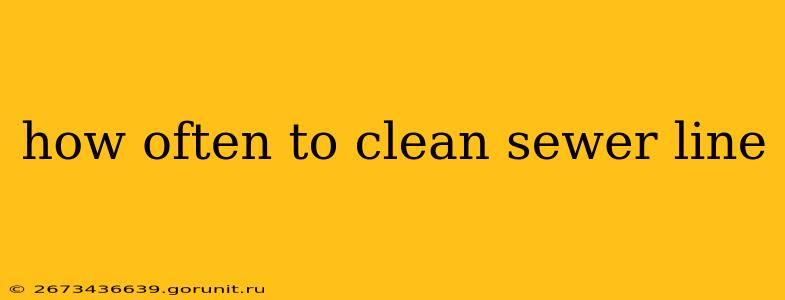Maintaining a healthy sewer line is crucial for preventing costly repairs and ensuring the smooth functioning of your plumbing system. But how often do you actually need to schedule a sewer line cleaning? The answer isn't a simple one-size-fits-all number. It depends on several factors, and understanding these factors is key to proactive plumbing maintenance.
Factors Affecting Sewer Line Cleaning Frequency
Several variables determine how frequently your sewer line requires professional cleaning. Ignoring these could lead to significant problems down the road (pun intended!).
1. Age of Your Pipes:
Older pipes, especially those made of cast iron or clay, are more susceptible to deterioration and clogs. These materials are prone to cracking and accumulating debris over time. Older homes may require more frequent sewer line cleaning than newer ones with PVC or other modern materials.
2. Household Size and Habits:
Larger households naturally generate more wastewater and waste materials. Similarly, habits like flushing inappropriate items (e.g., sanitary products, cooking grease, etc.) significantly increase the risk of clogs and necessitate more frequent cleaning.
3. Tree Roots:
Tree roots are a common culprit in sewer line blockages. They seek out moisture and can infiltrate pipes, causing cracks and restricting water flow. If you have trees near your sewer line, regular inspections and cleaning are essential.
4. Slope of the Sewer Line:
A poorly sloped sewer line can lead to slow drainage and the accumulation of waste. This encourages clogs and requires more frequent maintenance.
5. Type of Soil:
Clay soil, for example, can be more prone to causing sewer line problems than sandy soil. The composition of your soil can affect the integrity of your pipes and increase the chances of root intrusion.
Signs You Need Sewer Line Cleaning
Before discussing frequency, it's crucial to recognize the warning signs that indicate your sewer line needs attention:
- Slow Draining: Noticeably slow draining in multiple drains is a major red flag.
- Gurgling Sounds: Gurgling or bubbling sounds from drains suggest a blockage or partial blockage.
- Recurring Clogs: Frequent clogs in various drains point to a more significant problem within the main sewer line.
- Sewage Backup: This is a serious issue requiring immediate professional attention. A sewage backup indicates a significant blockage in your main sewer line.
- Foul Odors: Persistent foul smells emanating from drains or around your property can indicate sewer line problems.
Recommended Cleaning Schedule: A General Guideline
While there's no magic number, a general guideline for preventative sewer line cleaning is every 2-3 years for most households. However, this is just a starting point. Consider the factors listed above. If you have any of the warning signs mentioned, don't delay – schedule a professional inspection immediately.
Homes with older pipes, large families, or trees near the sewer line might benefit from more frequent cleaning – perhaps annually or even biannually.
Professional vs. DIY Cleaning:
While some minor clogs can be addressed with a plunger or drain snake, severe blockages require the expertise of a professional plumber. They have specialized equipment and the knowledge to effectively diagnose and clear significant blockages without causing further damage to your pipes.
Conclusion: Proactive Maintenance is Key
Regular sewer line maintenance is a proactive approach that saves you money and headaches in the long run. By considering the factors discussed and paying attention to warning signs, you can ensure your plumbing system operates smoothly and efficiently for years to come. Remember, prevention is always better – and cheaper – than cure.

